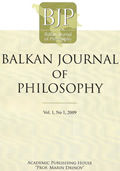The Phenomenological Ontology of Martin Heidegger as a Foundation for Redefining the Concept of Interpretative Approaches in the Theory of History
The Phenomenological Ontology of Martin Heidegger as a Foundation for Redefining the Concept of Interpretative Approaches in the Theory of History
Author(s): Ivelina IvanovaSubject(s): Philosophy
Published by: Институт по философия и социология при БАН
Keywords: Interpretation; Historical Writing; Heidegger; Phenomenological Ontology
Summary/Abstract: The paper examines the perspectives of an exchange between the phenomenological ontology of Martin Heidegger and a theory of history in the context of the problem of interpretative approaches in historical writing. The hypothesis is that the analyses offered by Heidegger in Being and Time and Ontology: The Hermeneutics of Facticity provide the foundation for mapping out new perspectives in the concept of interpretative approaches. The concept of interpretative approaches came to be actively used in academic texts relatively recently, since the 1980’s, and has often been employed quite unreflectively. But its wide currency, its heterogeneous and unreflective usage turned the concept of interpretative approaches into a theoretical problem. This paper will present a possible answer to that problem by examining the conceptual foundations of a redefined concept of interpretative approaches, drawn from the lectures read by Heidegger in the summer semester of 1923, more precisely §§16–28, 21–26, and the relevant discussion in Being and Time, starting with §12 and focusing on Part I, Chapter 5 (mainly §§32 and 33).
Journal: Balkan Journal of Philosophy
- Issue Year: III/2011
- Issue No: 2
- Page Range: 183-186
- Page Count: 4
- Language: English

